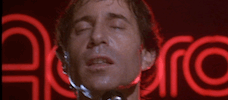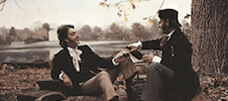Reviews
Robert M. Young
USA, 1980
Credits
Review by Evan Kindley
Posted on 14 December 2010
Source Warner Brothers Archives custom DVD
External links
Related music at Doom & Gloom from the Tomb
Categories Rock Follies
In 1977 Paul Simon had a small but memorable role in Woody Allen’s Annie Hall as Tony Lacey, an unctuous L.A. music producer. The surprise for long-time Simon fans was that, despite having shown no great interest in the theatrical aspects of rock performance throughout his career, he was actually a pretty good actor. (Simon’s erstwhile harmony partner Art Garfunkel had had the more notable acting career of the duo, appearing in Mike Nichols’ Catch-22 and Carnal Knowledge and in Nicolas Roeg’s Bad Timing.) The very qualities that made Simon an unlikely pop star - his unassumingly average looks, soft-spoken voice, diminutive height and air of intellectual aloofness - allowed him to be more believable than some of his contemporaries who were more eager to find their way into pictures.
Three years later, Simon appeared in another movie, this time as leading man as well as producer and co-writer (though not director, a task entrusted to veteran Robert M. Young). Not surprisingly, Allen’s mid-period style informs One Trick Pony: like them, it’s well-observed, wryly funny, neurotic, New York-focused, and more than a little self-involved - a vanity project in its own way, but certainly a far cry from the bacchanalian absurdity or overweening pretentiousness of the typical rock folly. The dialed-down tone is set in the first scene, which finds Simon’s alter ego Jonah Levin and his band passing through an airport in Cleveland. A gawky young Hare Krishna (played by a pre-Diner Daniel Stern) tries to push some spiritual literature on Jonah, who politely but firmly refuses, noting cannily, “This is not my first airport.”
Nothing that happens in One Trick Pony is Jonah’s first anything. A veteran singer-songwriter who scored a sizable hit in the 60s with an anti-Vietnam folk tune called “Soft Parachutes,” he and his band are out on the road testing some songs for a new record. Avoiding glamorization on the one hand and alienated bellyaching on the other, Simon and Young make a reasonable, understated case for the simple pleasures and occasional humiliations of life on the road. Some of the film’s best moments are its most casual, like the tour-bus scenes in which Jonah and his band list off the names of dead rock stars, perfectly illustrating the intensely geeky tendencies that lie beneath so many professional musicians’ impeccably cool exterior. The relationship between band members is comfortable, bordering on familial: keyboardist Clarence feels no compunction about walking in on Jonah in the bathtub, for instance, where he gazes down and says, “That’s it, huh?” “I am, after all, a Caucasian,” Jonah apologizes (the movie’s only reference to the interracial character of the Jonah Levin Band). One senses that it’s a ritual exchange, one that has taken place many times before.
The sureness of touch in these early scenes comes from Simon’s own years of journeyman professionalism. But One Trick Pony makes clear that this sense of ease has its down side. The tour is not a rousing success; among the indignities the Jonah Levin Band suffers are having to share a bill with “latest darlings of New Wave rock” the B-52s (who are meant to be beyond the pale, I guess, but are in fact exciting enough that you wish there was a little more of them).1 A newspaper review of one of the band’s concerts observes that Jonah “seems somewhat less ambitious these days,” and he has in fact fallen into something of a creative rut. The film’s title song, sung by Jonah in the first (and best) of many performance sequences, would seem to be describing his own limited abilities:
He’s a one trick pony / One trick is all that horse can do / He does one trick only / It’s the principal source of his revenue”
This suggests a sort of self-laceration on Levin/Simon’s part - it’s as if he’s berating himself for not being better. But then the song’s chorus arrives, introducing some intriguing ambiguity:
He makes me think about / All of these extra movements I make / And all of this herky-jerky motion / And the bag of tricks it takes / To get me through my working day
Here the implied perspective is that of a weary old pro who’s envious of a younger performer’s naive energy and artless passion: a guy who’s berating himself not for not being good enough but for being too good (or, at least, too fancy) - a criticism that was often leveled at the increasingly complex and sophisticated compositions Simon was writing over the course of the seventies.2
Making matters even more difficult to sort out is the fact that the melancholy, jazz-tinged set of songs Simon composed for the movie, while respectable enough, are far from his finest work. (Only one - opening credit theme “Late in the Evening” - appears on Simon’s greatest hits compilation Negotiations and Love Songs, and that’s one of the few we don’t get to see the band perform.) It’s even been speculated that the music in One Trick Pony is intentionally substandard, because Jonah is supposed to be a slightly more mediocre version of Simon himself, a sort of Stephen Dedalus to his James Joyce. That is, Simon’s such a genius he even knows how to sound like a little bit less of a genius in order to make an ironic point. Tempting as it is, I’m not entirely convinced by this overly generous explanation: while Simon is certainly modernist enough to play this kind of trick (this is a guy who hangs out with Derek Walcott, after all), he was probably not modest enough: his instinct is usually to swing for the fences, and if I had to guess I’d say we’re meant to be blown away by Jonah’s music, and incredulous that others don’t hear it the way we do.
Still, whether Jonah Levin is a mediocre has-been or a sadly neglected master craftsman, his problem is clear: for better or for worse, music has become too easy for him - habitual, comfortable, reflexive, and lacking in the excitement that draws most people to rock music in the first place. It’s also become something of an obstacle to his attempts to lead an adult life: thanks in part to his commitment to touring, his marriage is rapidly falling apart. Marion, who goes from being Jonah’s wife to his ex in the course of the film, calls his musical career “the longest adolescence I’ve ever seen” and characterizes him as “a grown man living in a kids’ world … Kids play rock’n’roll. Kids listen to it.” (Jonah seems to agree: later, when Marion accuses him of sounding like his son Matty, he replies, “I am Matty. Just older.”) These marital scenes are probably Simon’s best moments as an actor; he has convincing romantic chemistry with Blair Brown, who plays Marion, and it makes sense that a songwriter who specializes in rueful, nuanced love songs like “50 Ways To Leave Your Lover” and “Still Crazy After All These Years” would excel at portraying the difficulty of domestic relationships.
Rather less subtle is Simon’s satire of the venality of the music business, as represented by Rip Torn’s vaguely diabolic Walter Fox (reportedly modeled on CBS Records’ Walter Yetnikoff), an unfeeling mogul who is anxious to steer Jonah’s work in a more commercial direction. The music biz scenes are written a bit broadly (“Music, spectacle - what’s the difference if it sells records?”), though smartly underplayed by Torn and Allen Garfield. These scenes do offer the film’s one masterstroke, however: Lou Reed, cast hilariously against type as commercial superproducer Steve Kunelian.3 A man with “uncanny A.M. ears” who is proudly “very Top 40 oriented,” Kunelian buffaloes the band into adding slick overdubs to their record like a full string section, female gospel backing vocals, and saxophone (ironically, all elements that feature prominently on Reed’s 1978 classic Street Hassle … and that wouldn’t sound all that out of place on a contemporaneous Paul Simon record either, for that matter). Reed is very funny sending up his rep as unimpeachable cult artist by playing an industry smoothie - essentially, the Tony Lacey part - and, in fact, there should have been more of him: there needs to be more of a counterweight to Jonah’s purity, which borders on the tiresome after a while.
One Trick Pony came out at a crucial and uncertain moment in Simon’s career: though never as underappreciated as Jonah Levin, he was still toiling in the shadow of Simon & Garfunkel, and remained six years away from his triumphant return to megastar status with Graceland. It’s interesting to wonder what we’d make of the film now if things had gone differently and his musical career had slowly faded away, Jonah Levin-style. (Imagine Gordon Lightfoot or Jackson Browne making a similar film in 1980 and you begin to get the idea.) As it is, One Trick Pony provides a glimpse of a talented and successful artist wondering if he can afford to take it all for granted - an interesting alternative to the unshakable self-confidence projected by the average rock star on film. Instead of buffing his image to a celluloid shine, Simon allows his insecurities and anxieties about what he does to surface, hoping that his audience will only love him all the more. Maybe that’s why God made the movies?
- Simon was in fact a B-52s fan - they would subsequently open Simon & Garfunkel’s reunion concerts in Central Park in 1981 - but in the movie they clearly signify as cultural enemies: the acceptable face of punk. ↩
- Consider these piquant remarks from Robert Christgau’s 1980 Consumer Guide review of the One Trick Pony soundtrack, which could easily be a line of dialogue from the lukewarm notice quoted in the film itself: “while it’s literate, tasteful, etc., it’s also - self-evidently - the work of a man who thinks he’s too big for music (at five-foot-two, gosh). So if individual songs don’t stand out the way they have ever since ‘The Sound of Silence,’ maybe he doesn’t work as hard at them anymore.” ↩
- The use of other musicians is one of the film’s most notable aspects: besides Reed and the aforementioned B-52s, there are cameos from the Lovin’ Spoonful (playing “Do You Believe In Magic?” at the same “Salute to the Sixties” where Jonah finds himself trotting out “Soft Parachutes”), Sam and Dave, and Tiny Tim. ↩
More Rock Follies
-

Head
1968 -

Sympathy for the Devil
1968 -

Alice’s Restaurant
1969 -

200 Motels
1971 -

Journey Through the Past
1972 -

Human Highway
1982 -

Renaldo and Clara
1978 -

One Trick Pony
1980 -

Give My Regards to Broad Street
1984 -

The Man Who Fell to Earth
1976 -

True Stories
1986
We don’t do comments anymore, but you may contact us here or find us on Twitter or Facebook.



